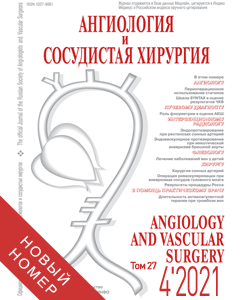Journal «Angiology and Vascular Surgery» •
2013 • VOLUME 19 • №2
Anticoagulant therapy in comprehensive treatment of acute thrombosis of lower-limb deep veins
Sultanov D.D., Gaibov A.D., Toirov M.G.
Vascular Surgery Department Republican Scientific Centre for Cardiovascular and Thoracic Surgery , Dushanbe, Republic of Tajikistan
The authors analysed the findings of examination and treatment of 61 patients presenting with acute thrombophlebitis of lower-limb deep veins, also investigating the risk factors for the development of acute thrombophlebitis. Of these, 54 (88.5%) patients were found to have various risk factors. During treatment we studied efficacy of anticoagulant therapy, also carried out examination of the blood coagulogram. Depending on the method of anticoagulant therapy, all patients were subdivided into two groups: Group One patients (n=30) received a combination of heparin and warfarin and Group Two patients were given monotherapy with heparin alone. It was determined that combined administration of two anticoagulants resulted in prolongation of the value of the activated partial thromboplastin time by 20% from the normal one in the majority of those receiving it (n=22, 73.3%), whereas in Group Two patients it was observed only in 12 (38.7%) patients. The values of the international normalized ratio in Group One patients were within the therapeutic (2.0-3.0) range, while in Group Two patients they were less than 2.0. There were neither haemorrhagic nor thrombolytic complications associated with administration of anticoagulants in either group. A combination of two anticoagulants turned out to be more effective for reaching adequate and safe hypocoagulation. The authors also worked out a therapeutic regimen and policy of follow up of patients presenting with acute thrombophlebitis. The comprehensive set of treatment included an effective route of paransal administration of the therapeutic mixture, favourably influencing the course and regress of the inflammatory process. The immediate results were as follows: good and satisfactory outcomes amounted to 93.4%, and poor results were noted in 6.6%. The short-term results were studied for up to 6 months revealing that 83% of patients had evidence of recanalization of the thrombosed veins, and only 17% demonstrated chronic occlusion.
KEY WORDS: acute thrombosis of deep veins, anticoagulant therapy.
P. 16
ARCHIVES MAGAZINE
2021 (Vol.27)
2020 (Vol.26)
2019 (Vol.25)
2018 (Vol.24)
2017 (Vol.23)
2016 (Vol.22)
2015 (Vol.21)
2014 (Vol.20)
2013 (Vol.19)
2012 (Vol.18)
2011 (Vol.17)
2010 (Vol.16)
2009 (Vol.15)
2008 (Vol.14)
2007 (Vol.13)
2006 (Vol.12)
2005 (Vol.11)
2004 (Vol.10)
2001 (Vol.7)
2000 (Vol.6)
1999 (Vol.5)
1998 (Vol.4)
1997 (Vol.3)


